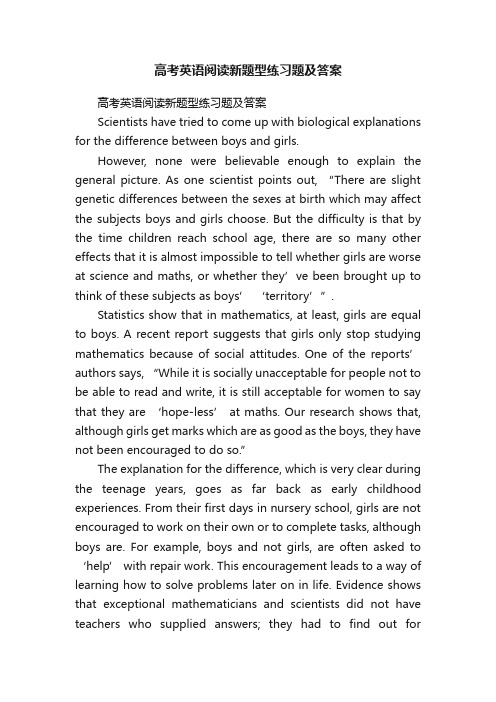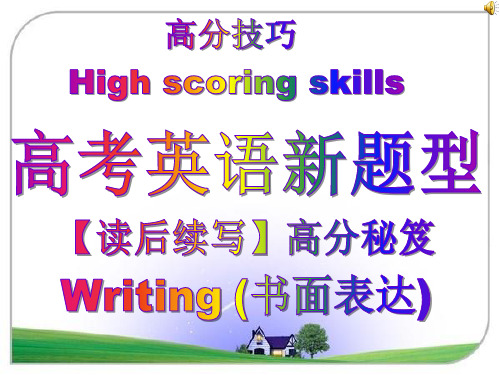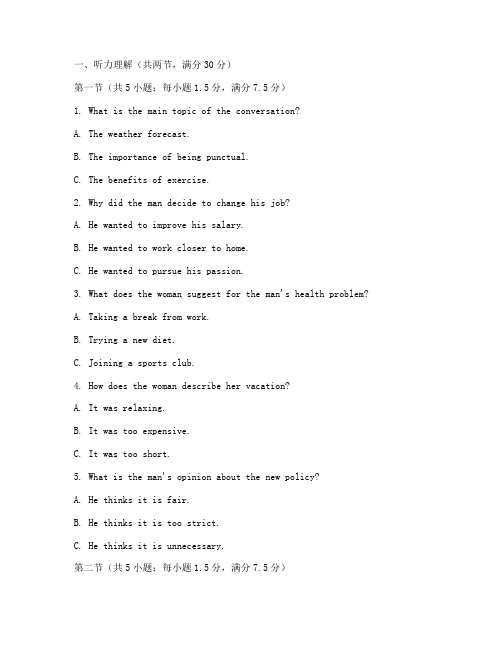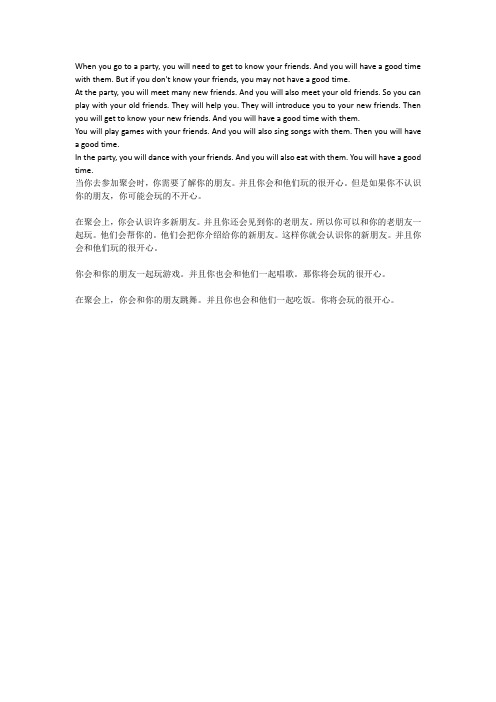英语高考新题型
探析山东省新高考英语改革下新题型“读后续写”的教学策略

探析山东省新高考英语改革下新题型“读后续写”的教学策略近年来,随着山东省新高考英语考试改革的推进,新题型“读后续写”成为了学生备考的重点和难点之一。
为了更好地应对这一题型,教师们需要调整教学策略,帮助学生提高对文本的理解能力和写作能力。
本文将。
首先,要提高学生的阅读能力。
由于“读后续写”题型要求学生根据给出的短文,按照一定的逻辑顺序完成续写,因此学生们在阅读理解的基础上,还需能准确把握文本的脉络和逻辑关系。
在教学中,可以通过精选有代表性的文本,引导学生进行多次阅读,并组织针对性的讨论和问答活动,以帮助学生提高对文本的理解能力。
此外,教师还可以选择一些与学生兴趣相关的话题和材料,激发学生的阅读兴趣,提高学生主动阅读的积极性。
其次,要提高学生的写作能力。
在“读后续写”题型中,学生需要根据给出的文章内容,进行逻辑衔接和扩展,丰富文章细节,使其更具连贯性和逻辑性。
因此,要提高学生的写作能力,教师可以通过多样化的写作练习,如写作稿件修改、写作讨论和写作竞赛等,激发学生的写作兴趣,培养学生的写作技巧。
此外,教师还可以通过引导学生进行议论文、记叙文等不同类型作文的写作,让学生在实践中掌握不同类型作文的写作技巧和特点。
此外,要注重培养学生的思维能力。
在应对“读后续写”的题目时,学生需要理清文章的逻辑关系,并能够进行适当的逻辑推理和联想。
因此,教师可以通过开展一些思维导图、逻辑思维训练和逻辑演绎等活动,培养学生的思维能力和逻辑推理能力。
同时,教师还需注重培养学生的创新思维和批判思维,鼓励学生进行多角度思考,培养学生的综合分析和归纳总结能力。
最后,要加强题型解析和训练。
对于“读后续写”这一新题型,学生们可能会缺乏经验和熟练度,因此,教师要对该题型进行深入的解析,明确评分标准和要求。
在教学中,可以组织模拟考试和模拟评分活动,让学生熟悉该题型的要求和评分标准。
同时,教师还可以编写一些针对该题型的训练材料,帮助学生进行反复训练和巩固。
高考英语阅读新题型练习题及答案

高考英语阅读新题型练习题及答案高考英语阅读新题型练习题及答案Scientists have tried to come up with biological explanations for the difference between boys and girls.However, none were believable enough to explain the general picture. As one scientist points out, “There are slight genetic differences between the sexes at birth which may affect the subjects boys and girls choose. But the difficulty is that by the time children reach school age, there are so many other effects that it is almost impossible to tell whether girls are worse at science and maths, or whether they’ve been brought up to think of these subjects as boys’ ‘territory’”.Statistics show that in mathematics, at least, girls are equal to boys. A recent report suggests that girls only stop studying mathematics because of social attitudes. One of the reports’ authors says, “While it is socially unacceptable for people not to be able to read and write, it is still acceptable for women to say that they ar e ‘hope-less’ at maths. Our research shows that, although girls get marks which are as good as the boys, they have not been encouraged to do so.”The explanation for the difference, which is very clear during the teenage years, goes as far back as early childhood experiences. From their first days in nursery school, girls are not encouraged to work on their own or to complete tasks, although boys are. For example, boys and not girls, are often asked to ‘help’ with repair work. This encouragement leads to a way of learning how to solve problems later on in life. Evidence shows that exceptional mathematicians and scientists did not have teachers who supplied answers; they had to find out forthemselves.A further report on maths teaching shows that teachers seem to give more attention to boys than to girls.Most teachers who took part in the study admitted that they expect their male students to do better at mathematics and science subjects than their female students. All of this tends to encourage boys to work harder in these subjects, gives them confidence and makes them believe that they can succeed.Interestingly, both boys and girls tend to regard such ‘male’ subjects like mathematics and science as difficult. Yet it has been suggested that girls avoid mathematics courses, not because they are difficult, but for social reasons.Mathematics and science are mainly male subjects, and therefore, as girls become teenagers, they are less likely to take them up. Girls do not seem to want to be in open competition with boys. Neither do they want to do better than boys because they are afraid to appear less female and so, less attractive.81. According to scientific studies, girls can learn maths as well as boys if___________________________________________________________________.82. Those who made extraordinary contributions in mathematics and science______________________________________________________________.83. Why are boys favored over girls when it comes to mathematics and science?________________________________________________________________ ____.84. What caused girls to give up mathematics courses?____________________________________________________________________.答案81. given enough encouragement.82. had the abilities of solving problems by themselves.83. Because teachers expect boys to do better in mathematics and science.84. Social reasons.【高考英语阅读新题型练习题及答案】。
高考英语新题型【读后续写】高分技巧

•Para 1: But no more helicopters came and it was getting dark again. Desperate and hopeless, Jane knelt down, tears streaming down her face. (并列情绪形容词) (2016年10月浙江高考读后续写范文摘录)
续写部分内容不仅要求词汇和语言框架的准确使用、语言的润色等,更重要的是,你要明白你应 该如何整理续写内容,以使得其和前文形成统一连贯的、能够表述完整信息的表达内容。
续写是读和写的统一,之间穿插了对阅读能力、概括能力、思维转化能力、语言领悟能力、语言 组织能力、创造性思维能力以及对上下文逻辑关系的掌握等的考查。
•Para 2: We had no idea where we were and it got dark. Exhausted and hungry, I wondered if we could find our way back.
3.使用非谓语动词
(2016年10月浙江高考读后续写范文摘录) Para1: But no more helicopters came and it was getting dark again. Feeling disappointed, Jane had to stay alone for another night. (-ing形式+情绪形容词) (2016年10月浙江高考读后续写范文摘录) Para 2: It was daybreak when Jane woke up. Feeling refreshed, she continued to walk along the stream to find the way out.(-ing形式+状态形容词)
新高考英语新题型试卷

一、听力理解(共两节,满分30分)第一节(共5小题;每小题1.5分,满分7.5分)1. What is the main topic of the conversation?A. The weather forecast.B. The importance of being punctual.C. The benefits of exercise.2. Why did the man decide to change his job?A. He wanted to improve his salary.B. He wanted to work closer to home.C. He wanted to pursue his passion.3. What does the woman suggest for the man's health problem?A. Taking a break from work.B. Trying a new diet.C. Joining a sports club.4. How does the woman describe her vacation?A. It was relaxing.B. It was too expensive.C. It was too short.5. What is the man's opinion about the new policy?A. He thinks it is fair.B. He thinks it is too strict.C. He thinks it is unnecessary.第二节(共5小题;每小题1.5分,满分7.5分)Directions: In this section, you will hear 5 short passages. At the end of each passage, you will hear some questions. Both the passage and the questions will be spoken only once. After you hear a question, you must choose the best answer from the four choices marked A), B), C) and D). Then mark the corresponding letter on Answer Sheet 2 with a single line through the centre.Passage OneQuestions 6 to 8 are based on the passage you have just heard.6. What is the main purpose of the passage?A. To introduce a new method of teaching English.B. To discuss the benefits of learning English.C. To explain the importance of speaking skills in English learning.7. Why do some people struggle with learning English?A. Because they lack motivation.B. Because they are not interested in English.C. Because they do not have access to good learning resources.8. What is the advice given to learners in the passage?A. Practice speaking and listening more.B. Focus on grammar and vocabulary.C. Find a good teacher to guide them.Passage TwoQuestions 9 to 11 are based on the passage you have just heard.9. What is the main topic of the passage?A. The impact of social media on teenagers.B. The importance of online privacy.C. The role of parents in monitoring their children's online activities.10. What are the main concerns expressed in the passage?A. The spread of misinformation.B. The negative effects on mental health.C. The loss of personal privacy.11. What does the speaker suggest to parents?A. To restrict their children's internet use.B. To communicate more with their children.C. To teach their children about responsible online behavior.二、阅读理解(共两节,满分40分)第一节(共20小题;每小题2分,满分40分)Directions: There are 4 passages in this section. Each passage is followed by some questions or unfinished statements. For each of them there are four choices marked A), B), C) and D). You should decide on the best choice and mark the corresponding letter on Answer Sheet 2 with a single line through the centre.Passage OneQuestions 12 to 16 are based on the following passage.The internet has become an integral part of our lives, and it has brought both benefits and challenges. One of the biggest challenges is the issue of online privacy. Many people are concerned about the amount of personal information that is collected and shared online. This information can be used for a variety of purposes, including targeted advertising, identity theft, and even political manipulation.There are several steps that individuals can take to protect their online privacy. First, they should be cautious about the information they share on social media platforms. They should avoid postingsensitive personal details, such as their full name, address, and phone number. Second, they should use strong passwords for their online accounts and enable two-factor authentication whenever possible. Third, they should be aware of the privacy settings on their devices and apps and adjust them to their preferences.Governments and companies also have a responsibility to protect the privacy of their citizens and customers. They should implement strict data protection policies and ensure that users are fully informed about how their data is being used. Additionally, they should provide users with the ability to control their personal information and opt-out of data collection.12. What is the main topic of the passage?A. The benefits of the internet.B. The challenges of online privacy.C. The importance of social media.13. What are the two main concerns about online privacy mentioned in the passage?A. Targeted advertising and identity theft.B. Spread of misinformation and political manipulation.C. Loss of personal privacy and negative effects on mental health.14. What are the three steps individuals can take to protect their online privacy?A. Avoid posting sensitive personal details, use strong passwords, and adjust privacy settings.B. Use social media responsibly, communicate with family, and report suspicious activities.C. Learn about data protection policies, teach children about online behavior, and use two-factor authentication.15. What is the responsibility of governments and companies inprotecting online privacy?A. Implement strict data protection policies and provide users with control over their personal information.B. Monitor online activities, restrict internet use, and educate users about privacy settings.C. Collect and share as much personal information as possible, as longas it is for legitimate purposes.16. What is the conclusion of the passage?A. Online privacy is a significant challenge that requires individualand collective action.B. The internet is a valuable tool, but it comes with risks that we must address.C. Social media is the primary source of online privacy concerns.Passage TwoQuestions 17 to 21 are based on the following passage.Climate change is a global issue that affects everyone. The effects of climate change can be seen in various forms, including rising sea levels, extreme weather events, and the loss of biodiversity. One of the most pressing challenges is the impact of climate change on agriculture.Agriculture is the backbone of the global economy, and it provides food and employment for billions of people. However, climate change is threatening the sustainability of agricultural systems. Changes in temperature and precipitation patterns can disrupt crop yields, leading to food shortages and increased prices.To address this challenge, scientists and policymakers are working on various strategies. One approach is to develop climate-resilient crop varieties that can withstand extreme weather conditions. Anotherapproach is to promote sustainable farming practices, such as crop rotation, agroforestry, and organic farming.Investing in research and development is crucial for the success of these strategies. Additionally, governments and international organizations must provide financial and technical support to farmers in developing countries, who are often the most vulnerable to the impacts of climate change.17. What is the main topic of the passage?A. The causes of climate change.B. The impact of climate change on agriculture.C. Strategies to mitigate the effects of climate change.18. What is the main challenge mentioned in the passage?A. The rising cost of food.B. The disruption of agricultural systems.C. The loss of biodiversity.19. What are the two strategies mentioned in the passage to address the challenge?A. Developing climate-resilient crop varieties and promoting sustainable farming practices.B. Investing in research and development and providing financial and technical support to farmers.C. Monitoring climate change and implementing strict regulations.20. What is the importance of research and development in addressing the challenge?A. It is essential for developing new crop varieties and sustainable farming practices.B. It is the only solution to the problem.C. It is unnecessary, as traditional farming methods are sufficient.21. What is the role of governments and international organizations in addressing the challenge?A. They should implement strict regulations and restrict agricultural activities.B. They should provide financial and technical support to farmers in developing countries.C. They should focus on reducing greenhouse gas emissions and promoting renewable energy.第二节(共10小题;每小题2分,满分20分)Directions: Read the following passage and answer the questions below.In recent years, there has been a growing interest in mindfulness, a practice that involves paying attention to the present moment without judgment. Mindfulness has been shown to have numerous benefits,including reducing stress, improving concentration, and enhancing emotional well-being.One of the most popular forms of mindfulness is meditation. Meditation involves sitting or lying down in a comfortable position and focusing on your breath, a word, or a phrase. The goal is to bring your attention back to the present moment whenever your mind wanders.Many people find that mindfulness practice helps them to become more aware of their thoughts and emotions. This increased awareness can lead to greater self-compassion and understanding. For example, if you are feeling stressed, you can use mindfulness to observe your stress without getting overwhelmed by it. Instead of reacting to your stress, you can respond to it with kindness and patience.Another benefit of mindfulness is that it can improve relationships. When you are more mindful, you are more likely to listen attentively and respond thoughtfully. This can lead to more meaningful and fulfilling interactions with others.22. What is the main topic of the passage?A. The benefits of mindfulness.B. The different forms of mindfulness.C. The practice of meditation.23. What is the goal of meditation?A. To improve concentration.B. To bring attention to the present moment.C. To relieve stress.24. What can mindfulness practice help individuals to do?A. To become more aware of their thoughts and emotions.B. To develop self-compassion and understanding.C. To improve relationships.25. How can mindfulness improve relationships?A. By helping individuals to listen attentively and respond thoughtfully.B. By reducing stress and improving emotional well-being.C. By promoting self-compassion and understanding.26. What is the main benefit of mindfulness practice mentioned in the passage?A. Reducing stress.B. Improving concentration.C. Enhancing emotional well-being.27. How does mindfulness help individuals to deal with stress?A. By bringing attention to the present moment.B. By observing their stress without getting overwhelmed.C. By developing self-compassion and understanding.28. What is the role of mindfulness in improving relationships?A. By promoting self-compassion and understanding.B. By helping individuals to listen attentively and respond thoughtfully.C. By reducing stress and improving emotional well-being.29. What is the author's attitude towards mindfulness practice?A. Positive.B. Negative.C. Neutral.30. What is the conclusion of the passage?A. Mindfulness practice is beneficial for individuals and relationships.B. Mindfulness practice is a simple yet effective way to improve one's life.C. Mindfulness practice is only suitable for those who are interested in meditation.。
2024年北京高考英语作文新题型

When you go to a party, you will need to get to know your friends. And you will have a good time with them. But if you don't know your friends, you may not have a good time.At the party, you will meet many new friends. And you will also meet your old friends. So you can play with your old friends. They will help you. They will introduce you to your new friends. Then you will get to know your new friends. And you will have a good time with them.You will play games with your friends. And you will also sing songs with them. Then you will have a good time.In the party, you will dance with your friends. And you will also eat with them. You will have a good time.当你去参加聚会时,你需要了解你的朋友。
并且你会和他们玩的很开心。
但是如果你不认识你的朋友,你可能会玩的不开心。
在聚会上,你会认识许多新朋友。
并且你还会见到你的老朋友。
所以你可以和你的老朋友一起玩。
他们会帮你的。
他们会把你介绍给你的新朋友。
这样你就会认识你的新朋友。
并且你会和他们玩的很开心。
2024年陕西新高考英语题型和分值

2024年陕西新高考英语题型和分值随着教育改革的不断深化和高考制度的不断完善,2024年陕西新高考英语题型和分值也将迎来一系列的变化。
为了让广大考生和家长提前了解新高考的情况,本文将就2024年陕西新高考英语的题型和分值进行详细介绍。
一、听力理解2024年陕西新高考英语听力理解部分将继续保持传统的四个部分:听对话回答问题、听短文回答问题、听对话和短文填空、听对话和短文选择答案。
听力理解部分将占据整个英语试卷的30分值,共计数十道题目。
二、阅读理解阅读理解是英语试卷中的重中之重,2024年陕西新高考英语阅读理解部分将有所调整,除传统的选择题外,还将增加完形填空和匹配题。
阅读理解部分将占据整个英语试卷的30分值,共计数十道题目。
三、完形填空在2024年陕西新高考英语试卷中,完形填空将有所调整,不再是传统的短文填空,而是加大对学生逻辑推理能力和词汇应用能力的考查。
完形填空将占据整个英语试卷的10分值,共计数十道题目。
四、写作写作一直是英语试卷中最具挑战性的部分,2024年陕西新高考英语写作部分将增加议论文和图表作文,考查学生的逻辑思维和数据分析能力。
写作部分将占据整个英语试卷的10分值。
五、翻译翻译一直是英语试卷中的难点,2024年陕西新高考英语翻译部分将保持传统的中译英和英译中,但对翻译技巧和词汇应用能力有所加大考查。
翻译部分将占据整个英语试卷的20分值,共计数十道题目。
六、口语2024年陕西新高考英语口语部分将作为最新加入的一项测试,主要考查学生的口语表达能力和语音语调。
口语部分将占据整个英语试卷的10分值。
总结:2024年陕西新高考英语试卷将更加注重学生的综合语言能力和创造性思维能力,题型和分值都有所调整,希望广大考生能够提前做好准备,迎接新的挑战。
2024年陕西新高考英语题型和分值的调整对学生的备考和应试能力提出了更高的要求。
下面将为大家详细解读各部分的题型和分值,以及针对新题型的备考建议。
1. 听力理解2024年陕西新高考英语听力理解部分将保持传统的四个部分,但可能会加大考查学生对于细节和推理能力的要求。
最新2024高考英语题型盘点,高考改革后的英语题型
最新2024高考英语题型盘点,高考改革后的英语题型2024年高考英语题型盘点与改革后的英语题型随着新高考改革的不断推进,2024年高考英语试卷的题型也将发生一些变化。
本文将为大家盘点2024年高考英语的最新题型,并分析改革后的英语题型,探讨其可能对学生的影响。
一、听说题型:1、听说测试:作为高考英语试卷的重要组成部分,听说测试将更加注重考察学生的实际交流能力。
听说测试可能会包括一些情境模拟,如对话、短文听力、角色扮演等,旨在评估学生的听力理解、口语表达和交流技巧。
2、机考形式:部分省份的听说测试将采用机考形式进行,这对学生适应现代化考试模式和电子设备操作的能力提出了更高的要求。
二、阅读理解:1、多项选择题:阅读理解仍将沿用多项选择题的形式,但可能会增加题量或提高难度,以更好地考察学生的阅读速度和准确度。
2、主观题:为了更好地评估学生的阅读理解能力,可能会出现一些主观题,例如问答题或短文摘要写作等。
三、完形填空:1、取消单项选择:完形填空可能将不再采用单项选择的形式,而是提供一些语境空白,让学生根据上下文填写适当的单词或短语。
2、注重语用能力:这种改革旨在更加注重学生的语用能力和语境理解,而非单一的语法知识。
四、语法填空:1、整体考查:语法填空题可能会更加注重学生对英语语法结构的整体掌握,通过提供一些语境线索,让学生在空格中填写适当的单词或词组。
2、形式变化:语法填空的形式可能会发生变化,例如可能会采用短文或对话形式,以更好地融入听说测试和阅读理解的情境。
五、写作:1、应用文写作:写作部分将继续强调应用文写作,例如信函、通知、便条等,以评估学生在实际情境中的写作能力和语言运用能力。
2、读后续写:为了考察学生的阅读理解和创作能力,写作部分可能会采用读后续写的方式,让学生根据所提供的文章进行续写或改写。
3、内容概要:为了提高学生的综合语言运用能力,写作部分可能会要求学生对所提供的文章进行内容概要或评论,以评估学生的阅读理解、写作技巧和批判性思维。
23年英语一新题型题目
2023年英语一新题型题目因试卷类型不同而有所差异。
以新高考全国一卷为例,其部分题目如下:
- 阅读理解:
- 第一篇是应用文,主要讲了在荷兰阿姆斯特丹进行自行车租赁,以及雇佣导游的方式、价格等相关事项。
- 第二篇是记叙文,主要讲了John Todd通过创新“生态设计”,处理废物废水的故事。
- 第三篇是说明文,主要讲了数字极简主义的要求和原理,倡导简单的数字生活方式。
- 第四篇是说明文,主要讲了“群体智慧”这一效应及其相关研究。
- 七选五匹配题:主要讲了“自我宽恕”有关的主题。
- 语言运用:
- 第一节完型填空,主要讲在美国明尼苏达州的一次越野赛中,Melanie Bailey背着Danielle Lenoue(膝盖有伤)一起抵达终点,并接受医疗检查才知道Danielle Lenoue膝盖有重伤的助人故事。
- 第二节语法填空,主要讲了我国的传统美食小笼包的美味、起源、以及制作方法等。
- 写作:
- 第一节,假定你是李华,外教Ryan准备将学生随机分为两人一组,让大家课后练习口语,你认为这样分组存在问题。
请你给外教写一封邮件,内容包括:1. 说明问题;2. 提出建议。
- 第二节,短文续写,主要讲作者不爱写作,但社会学老师坚持让
他参加一个写作比赛,并在老师的鼓励下终于寻找到了写作的乐趣和意义。
高考英语新题型
高考英语新题型
高考英语新题型可能包括以下几种:
1. 阅读理解题型的变化:除了常见的选择题、填空题和判断题,可能还增加了更多的细节理解题、推理判断题、观点态度题等,考察学生对文章内容的理解和分析能力。
2. 概括归纳题型:要求学生根据所给文章或对话的内容,将其中的重点、要点概括出来,考察学生对文章结构和信息的整合能力。
3. 表格填空题型:给出一张表格或图表,要求学生根据所给资料填写相关的信息,综合运用语法和词汇知识。
4. 语法填空题型:给出一篇短文,将其中一些空格处标号,要求学生根据语法规则和上下文的意思填写适当的词语或短语,考察学生对英语语法的掌握程度。
5. 完形填空题型:给出一篇短文,其中有若干个空格处要求填入一个适当的词语,考察学生对词汇、语法和语言逻辑的理解和运用能力。
6. 图文匹配题型:给出一组图片或图表,要求学生根据所给的图片或图表内容,从一些选项中选择最合适的文字描述,考察学生对图片或图表信息的理解和应用能力。
以上是对高考英语新题型的一些猜测和推测,具体题型以各地
区教育考试部门的要求和出题习惯为准。
深入了解和掌握各种题型,培养综合运用英语知识和技能的能力是应对高考的关键。
英语高考新题型考卷
英语高考新题型考卷一、听力理解(共两节,满分30分)第一节(共15小题;每小题1.5分,满分22.5分)听下面5段对话。
每段对话后有几个小题,从题目的备选项中选出最佳选项。
听完每段对话后,你都有10秒钟的时间来回答有关小题和阅读下一小题。
每段对话仅读一遍。
1. What will the man do after lunch?A. Go to the library.B. Visit a friend.C. Take a nap.2. Why is the woman late for the meeting?A. She got stuck in traffic.B. She forgot the time.C. She had an appointment.3. What does the man suggest they do?A. Watch a movie.B. Go for a walk.C. Cook dinner together.第二节(共5小题;每小题1.5分,满分7.5分)听下面5段独白。
每段独白后有几个小题,从题目的备选项中选出最佳选项。
听完每段独白后,你都有10秒钟的时间来回答有关小题和阅读下一小题。
每段独白仅读一遍。
6. What is the main topic of the speaker's speech?A. Environmental protection.B. Healthy lifestyle.C. Career planning.7. What is the speaker's attitude towards the new policy?A. Supportive.B. Indifferent.C. Opposed.8. What advice does the speaker give to the audience?A. Work harder.B. Take a break.C. Learn from others.二、阅读理解(共20小题;每小题2分,满分40分)阅读下面四篇文章,从每篇文章后的题目中选出最佳选项。
- 1、下载文档前请自行甄别文档内容的完整性,平台不提供额外的编辑、内容补充、找答案等附加服务。
- 2、"仅部分预览"的文档,不可在线预览部分如存在完整性等问题,可反馈申请退款(可完整预览的文档不适用该条件!)。
- 3、如文档侵犯您的权益,请联系客服反馈,我们会尽快为您处理(人工客服工作时间:9:00-18:30)。
各省市区高考改革时间表
执行时间 2017年 2020年 浙江、上海 北京、山东、湖南、天津、辽宁、江西、 吉林、安徽、湖北、新疆、内蒙古 省 份
2021年
2022年
河北、河南、山西、福建、四川、江苏、 广东、青海、重庆、海南、贵州、西藏、 黑龙江 宁夏、甘肃、陕西、云南、广西
新高考题型与分值
Park Avenue had been quiet a moment before. Now the air was filled with the sound of the alarm and the shouts of people running from all directions. Cars stopped and the passengers joined the crowd in front of the bank. People asked each other, “What happened?” But everyone had a different answer. Arthur, still carrying the suitcase, turned to look at the bank and walked right into the young woman in front of him. She looked at the suitcase and then at him. Arthur was surprised. “Why is she looking at me like that?” He thought. “The suitcase! She thinks I’m the bank thief!” Arthur looked around at the crowd of people. He became frightened, and without another thought, he started to run.
部分 听力(20题30分) 阅读理解(3篇 25分,七选五 10分) 35分 语言运用(完形20空30分,语法填空 10空15分) 写作(应用文15分,续写或概要 25分) 40分 总计 分值 30 35 45 40 150
第四部分:写作 由一、二两节组成,考查考生根据特定 要求完成写作任务的能力。 第一节:应用文写作 15分 要求考生根据所给情景,写一篇80词左 右的短文。情景包括目的、对象、时间、地 点、内容等;提供情景的方式有提纲、图画、 图表等。
第二节:概要写作(满分25分) 阅读下面短文,根据其内容写一篇60词左右 的内容概要。
Getting rid of dirt, in the opinion of most people, is a good thing. However, there is nothing fixed about attitudes to dirt. In the early 16th century, people thought that dirt on the skin was a means to block out disease, as medical opinion had it that washing off dirt with hot water could open up the skin and let ills in. A particular danger was thought to lie in public baths. By 1538, the French king had closed the bath houses in his kingdom. So did the
king of England in 1546. Thus began a long time when the rich and the poor in Europe lived with dirt in a friendly way. Henry IV, King of France, was famously dirty. Upon learning that a nobleman had taken a bath, the king ordered that, to avoid the attack of disease, the nobleman should not go out. Though the belief in the merit of dirt was long-lived, dirt has no longer been regarded as a nice neighbor ever since the 18th century. Scientifically speaking, cleaning away dirt is good to health. Clean water supply and hand washing are practical means of preventing disease. Yet, it seems that standards of cleanliness have moved beyond science since World War Ⅱ. Advertisements
第二节:读后续写或概要写作。两种形式在不同考次不定期 交替使用。(25分) 题型1:读后续写。提供一段350词以内的语言材料,要求考生
依据该材料内容、所给段落开头语和所标示关键词进行续写
(150词左右),将续写成一篇与给定材料有逻辑衔接、情节 和结构完整的短文。阅卷时将主要考虑以下内容: (1)与所给短文及段落开头语的衔接程度; (2)内容的丰富性和对所给关键词语的覆盖情况; (3)应用语法结构和词汇的丰富性和准确性; (4)上下文的连贯性。
One possible version: As he was running, Arthur heard the young man shouting behind:“Stop, stop!” Arthur immediately realized that the young man was the bank robber. So Arthur didn’t stop, but continued to run until he saw and caught a taxi in front of him. He quickly put the suitcase in the car and said to the driver, “Please hurry to the Police Station. I have a case to report to the police; the man shouting behind is the bank thief!“The taxi raced away to the Police Station like an arrow. The taxi stopped in front of the Police Station and Arthur said to the police who had been waiting and who had already received the robbery report, This suitcase is that of the bank robber. It may be filled with the money stolen from the bank, I hand it to you. Please get ready to arrest the man ”
第二节:读后续写(满分25分)
阅读下面短文,根据所给情节进行续写,使之构成
一个完整的故事。
A funny thing happened to Arthur when he was on the way to work one day. As he walked along Park Avenue near the First National Bank, he heard the sound of someone trying to start a car. He tried again and again but couldn’t get the car moving. Arthur turned and looked inside at the face of a young man who looked worried. Arthur stopped and asked, “It looks like you’ve got a problem,” Arthur said.
repeatedly sell the idea; clothes need to be whiter than white, cloths ever softer, surfaces to shine. Has the hate for dirt, however, gone too far? Attitudes to dirt still differ hugely nowadays. Many first-time parents nervously try to warn their children off touching dirt, which might be responsible for the spread of disease. On the contrary, Mary Ruebush, an American immunologist(免疫学家), encourages children to play in the dirt to build up a strong immune system. And the latter position is gaining some ground.
英语高考新题型
综合语言运用能力→ 英语核心素养
以立德树人为核心,强化高考考试内容改革的
